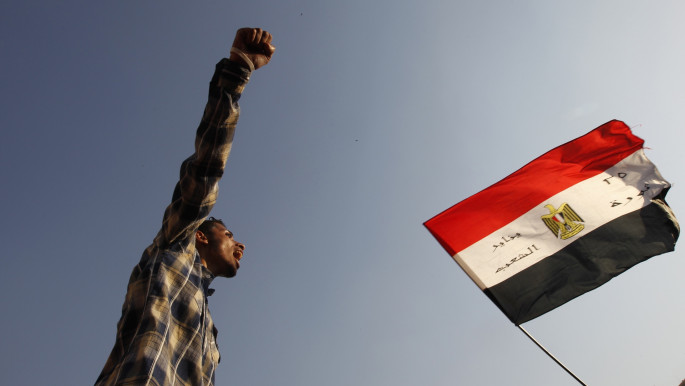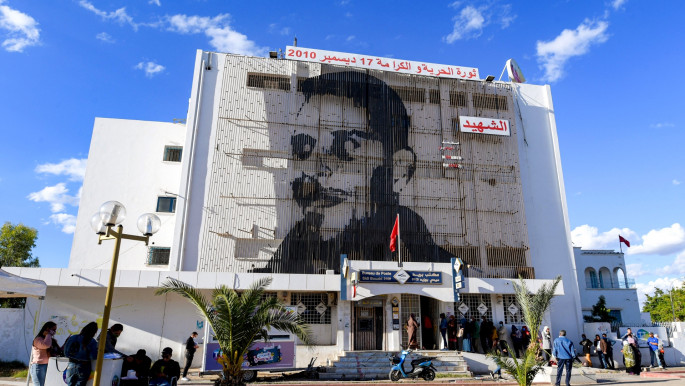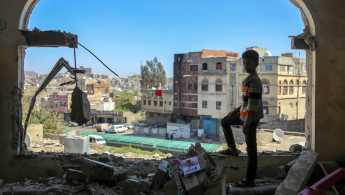How the odds were stacked against Yemen's Arab Spring revolution
For many Yemenis, this historic event signalled a shift away from oppression towards unified hopes for freedom. It ultimately led to huge setbacks however, in the form of a brutal conflict, humanitarian anguish and counter-revolutionary agendas.
Tens of thousands of Yemenis began demonstrations in Sana'a, which soon spread to other major cities including Taiz, Aden and Mukalla, in what was called the Revolution of Dignity. Though they faced the violence of security forces, protestors still stood strong in their desires for better livelihoods.
Saleh initially agreed to stand down in May 2011 in a Gulf Cooperation Council (GCC)-brokered agreement, though he quickly reverted from this decision, triggering further violent outbreaks, while calls for peace continued from below. Ultimately, he agreed to transfer power to the Saudi Arabia-backed Abdrabbuh Mansour Hadi in November 2011.
 |
For many Yemenis, the historic protests of 27 January signalled a shift away from oppression towards unified hopes for freedom |  |
A promising movement
Nabil al-Bokairi, a Yemeni researcher, described it as one of the most peaceful and civil Arab Spring uprisings, which managed to reach "the first stages of political and democratic transition through the completion of the national dialogue and the draft constitution."
"However, it turned against Yemeni legitimacy and transformed the Yemeni revolution from a democratic transformation into a sectarian coup that subsequently turned into a civil and regional war that has not stopped since its outbreak six years ago," he told The New Arab.
 |
|
| Read more: Ten years on, did Egypt's January 25 revolution fail? |
Inspired by Tunisia's Jasmine Revolution in December 2010 which ousted dictator Zine al-Abidine Ben Ali, and created a domino effect of protests across the region in what was known as the Arab Spring, Yemenis took to the streets to force change.
"When we went out as young people, our first cries were directed towards better business opportunities and better education," Saif al Haddi, a Yemeni peacebuilding activist, told The New Arab. "But we saw that achieving this means overcoming an ancient system that stands between us and the investment of Yemen's energies and resources."
The revolution was seen as positive for initially uniting Yemenis from all walks of life, including liberals, socialists, feminists and Islamists, all with the same ambition of regime change.
"I started from the second day of the demonstrations in January 2010, as I only knew the first day from Facebook, and then I contacted other young people of the Socialist Party who had the initiative and the first spark to call the youth and rally from gatherings of members of the Socialist Party Students' Union at Sana'a University," said al Haddi.
"I participated in all the rallies and travelled to a number of governorates of the republic to invite friends and discuss with them in order to organise the revolution, but since May 2010 I stopped going out with the marches after the revolution deviated from its course," he added.
 |
When we went out as young people, our first cries were directed towards better business opportunities and better education |  |
"We launched our goals with shouts in the air, but we did not have realistic mechanisms to convert these goals into a tangible reality, instead turning them into bubbles and slogans only." Al Haddi added that a lack of unified agreement over the revolution's path, without substantial leadership to represent it, eventually fractured the movement.
The role of women
However, there were also positives in that the revolution shifted the debate over the role of women, who played a prominent part in the revolution and joined the struggle for change.
"The distinctive presence of Yemeni women in the revolution was very striking to a patriarchal and conservative Yemeni society," Saba Hamzah, who took part in the revolution, now living in the Netherlands, told The New Arab. "Women got a physical space where they got the opportunity to speak up. They broke the silence and challenged the social and political barriers."
"Some women focused on women's rights and devoted their struggle in the revolution to guarantee the momentum of women's participation would continue even after the revolution." She added that there is still much work to be done to give women more of a prominent position in Yemen's political decision making.
"Many people, men and women, stood against the notion of struggling for women's rights claiming they should wait until the revolution is over," said Hamzah. "Now 10 years later we can still hear the same sounds asking women to pause calling for their rights until the war is over."
"Yemeni women seek justice, peacebuilding, and the end of the war because they know well what it means to fight in endless wars."
Counter-revolutionary agendas
However, there were other forces seeking to derail the revolution and steal the hopes of freedom away from the people. The first was the Houthi insurgency in September 2014, which crushed a transitional decentralisation agreement and dragged the country into civil war.
"The biggest challenge facing the ongoing Yemeni revolution is the counter-revolution with its sectarian and racial background represented by the Iranian-backed Houthi group," said al-Bokairi. "It led to the hijacking of the Yemeni revolution and diverted its path towards war and destruction."
Amid a decision from Washington to designate the Houthis as a Foreign Terrorist Organisation (FTO), Yemenis last week circulated the hashtag 'HouthiTerrorisminYemen' across Facebook and Twitter, calling on the international community to acknowledge the faction's abuses, oppression and its crushing of hopes for peace in Yemen.
 |
The distinctive presence of Yemeni women in the revolution was very striking to a patriarchal and conservative Yemeni society |  |
Aid groups, meanwhile, have warned that the move could choke humanitarian supplies to Yemen, as almost 80 percent of Yemenis live in areas under Houthi control and require humanitarian assistance.
Yet along with the Houthis and Iran's counter-revolutionary efforts, the devastating Saudi-led war on the country since March 2015 has dealt a final blow to the revolution and transformed the journey of Yemenis from one of freedom into enduring one of the world's worst humanitarian crises in decades.
The United Nations says the conflict has claimed 233,000 lives in the past six years. Saudi Arabia's disastrous air war, which has seen airstrikes on schools, weddings and hospitals, has killed thousands of civilians, leading to accusations of war crimes. Thousands more have been killed from preventable causes such as disease and malnutrition, with millions "one step away" from famine.
The Saudi and Emirati intervention "represented a real challenge to any revolution and democratic transformation in the entire Arab region," al-Bokairi said.
 |
|
| Read more: A decade on, Tunisia's revolutionary demand for economic justice remains unmet |
Though both countries claimed to intervene to reinstate Hadi and defeat the Houthi insurgency, they also sought to gain their own geopolitical stake in the country.
This continues today, as Saudi Arabia and the UAE try to uphold their desired factions – namely the Saudi-backed Hadi government and Emirati-backed separatist Southern Transitional Council (STC), in a fragile power-sharing deal called the Riyadh Agreement. Meanwhile, Yemenis continue to suffer as the country edges closer to one of the worst famines seen in generations.
While Barack Obama's administration initially supported the conflict through arms sales to the Saudi-led coalition, along with the United Kingdom and France, Trump worsened the crisis with further military support, justified by a need to retain American jobs. His decision to designate the Houthis as an FTO was more about hurting its Iranian backers than helping Yemenis.
Joe Biden's electoral victory in the United States has raised hopes that Washington will take steps to put an end to the war, and he has temporarily frozen arms sales to Saudi Arabia and the UAE. However, the details of his administration's Yemen policy still remain vague.
Even if Biden does fulfil his pledges to end the war, those that took part in the revolution clearly feel that there is much work to be done. For many, this would involve listening to the voices of Yemenis themselves and empowering civilians with greater opportunities to participate in the country's future.
Jonathan Fenton-Harvey is a journalist and researcher who focuses on conflict, geopolitics and humanitarian issues in the Middle East and North Africa
Follow him on Twitter: @jfentonharvey



